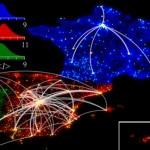 As more of us are on social networks, and indeed more about each of us is shared online, there have been numerous stories emerging of the insights into our lives and behaviors that can be gleaned from our postings online.
As more of us are on social networks, and indeed more about each of us is shared online, there have been numerous stories emerging of the insights into our lives and behaviors that can be gleaned from our postings online.
A new paper from researchers at City College of New York highlights the kind of things that can be easily gleaned from publicly available postings online. It shows that we can infer not only ones economic status, but also how they are likely to react to certain issues and the policy stances they will take. Rather than inferring this from the content we share however, the research infers this simply from our position in our networks.
Delving into big data
The team trawled through two big data sets: one of which was phone calls from the entire Mexican population over a three month period, and the second banking data from a smaller sample of around 500,000 bank clients (all anonymized).
“It is commonly believed that patterns of social ties affect individuals’ economic status,” the researchers say. “We analyzed these two large-scale sources – the telecommunications and financial data of a whole country’s population. Our results showed that an individual’s location, measured as the optimal collective influence to the structural integrity of the social network, is highly correlated with personal economic status.”
It emerged that the social network patterns of influence closely mirrored that of economic inequality in the country. For pragmatic use and validation, Makse and his colleagues carried out a marketing campaign that showed a three-fold increase in response rate by targeting individuals identified by their social network metrics as compared to random targeting.
The study is part of a wider trend that is hoping to better understand how our social networks form, and their influence on our behavior. For instance, a MIT study from a few years ago examined how networks evolve within cities.
The study finds that, contrary to previous thinking, our urban networks are often determined by social ties rather than geography.
“I was interested to investigate the relationship of social networks and human distance with the built environment and urban transportation,” the authors say. “We found that geography plays only a minor role when forming social networking communities within cities. Unlike the country, cities have more dispersed communities.”
The study showed how cities fundamentally change the structure of social networks. Through monitoring over 7 billion phone interactions they were able to explore the role both social and geographic distances play in the formation of our social networks.
It emerged that social distance played a much bigger role than geographic proximity. In other words, our social networks are formed of people with comparable interests and careers rather than those who reside or work nearby.
By better understanding how networks form, researchers and policy makers hope to make more informed decisions, which with more and more of us living in urban environments, has to be better for all concerned.